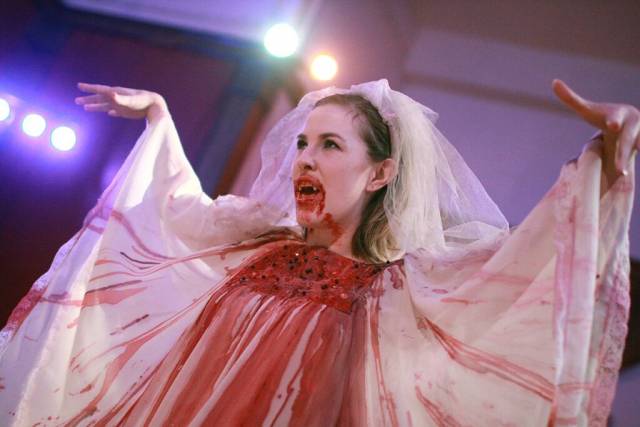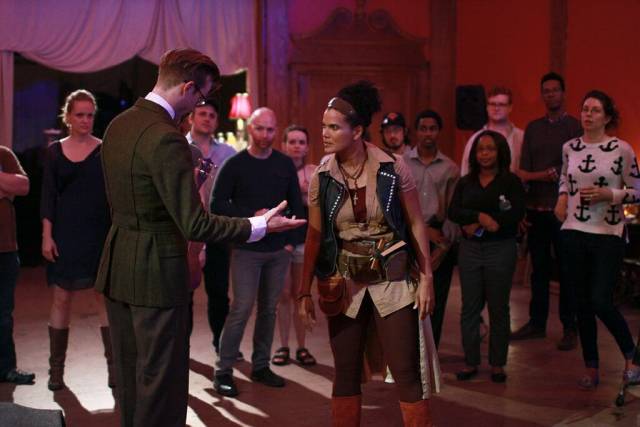
 We talked to Three Day Hangover co-founder David Hudson and director Kristin McCarthy Parker about their immersive production of Bram Stoker's Dracula, and what they think is the future of theatre.
We talked to Three Day Hangover co-founder David Hudson and director Kristin McCarthy Parker about their immersive production of Bram Stoker's Dracula, and what they think is the future of theatre.
Dracula in a church has got to be the most blasphemous thing ever, but it also works great because the setting is already so creepy to begin with. How’d you ask the venue to let you do your show there?
David: In the past our shows have been primarily performed in bars, and for Dracula and Tartuffe we figured we wanted to venture into our own space and try to have something more unique, and site-specific. We searched all over Manhattan, stumbled upon West Park and when you first walk into that room, with that off-red color in its walls and that chandelier, which gave it a spooky feel for Dracula, and was regal enough for Tartuffe. We had some great scenic designers who gave the room its finishing touches.
Kristin, working with playwright Steven Dietz what would you say were some of the challenges to make Dracula feel fresh?
Kristin: We’re inundated with vampires right now, Steven adapted the play directly from Bram Stoker’s book, in order to make it fresh we had to balance the horror and melodrama with the audience interaction of Three Day Hangover, we found ways to honor the material and comment on vampire conventions.
Where does the role of a director stop in a show where you know you won’t be able to control every single aspect of at some point?
Kristin: I’ve done shows that have been more immersive, they require the audience to actually become involved in the show so I wasn’t super afraid of it in that way, but the reality of how much the audience changes the show the second they walk into the theater never really hits you until opening night. So we navigate that with the cast, what to do when people aren’t hearing them for instance. We work on how to make the experience unique for each audience, the actors have the freedom to change lines and talk about the weather for instance, or react to what the audience is doing. That’s a muscle you don’t often get to use in the theatre world. It’s been a challenge but it’s been a fun challenge.
 Have you found that specific shows/authors bring out specific things in people? Are people more reverential in Shakespeare shows for instance?
Have you found that specific shows/authors bring out specific things in people? Are people more reverential in Shakespeare shows for instance?
David: It’s kind of interesting, it’s a very healthy mix,we have a lot of people who come to it from a theatrical or literary background, who might have studied Shakespeare or Chekhov, and have a very firm grasp on the story or the language, and then you have audience members who perhaps have never been to the theatre before, but their friends told them about this fun event where they can drink and hang out. It’s a crazy balance and I feel that both sides of this audience rub off on each other, so maybe people who wouldn’t be as OK with the changes that we make, are more OK once they see how people who have never seen it react to these changes. The people who don’t care much about the story get to care more because they see how people who know the story and have never seen it told this way are reacting to it. It’s a really cool dichotomy, we aim to win our audience with the story and the event, so it feels like a night out where you’re also getting a story told.
Kristin: What’s also fun, is that if the subject matter is so familiar, we can play off on people’s expectations and subvert them a bit.
I love that Van Helsing isn’t Van Helsing, but Van Yuengling and is played by a woman who happens to be the awesome January LaVoy. Can you comment on the role of theatre in promoting diversity?
David: We have an extremely diverse audience and they want to see themselves reflected onstage, so it’s important to seek out every possible voice that we can find, whether that’s based on race, gender or sexual orientation, that’s important to us because we’re in the business of telling stories that people care about. The brilliant thing about this cast is that they’re a talented group of individuals who have decided to come together and give us their time and talent, we also have someone in Steven Dietz who allowed us to change Van Helsing into a woman, and maybe a lot of writers wouldn’t have been as cool with that as he was. He was excited from the get-go!
Kristin: In the story the only two female characters in the show would’ve been victims, so getting a female Van Helsing is so empowering, it’s powerful to see women outside the typical victim role.
I’m not an actor but I feel that doing a show surrounded by people who are drunk and yell at me would be a great acting exercise. How do you work with the actors to let them shed vanity and stay in character? Do you use this method to teach acting?
David: We’ve done a couple of workshops with high school students, obviously without the alcohol influence, but the universal thing that we’re aiming for is that the audiences experience the show rather than just watch it. I say to the actors “in what other show will you be at, where the audience can actually boo Dracula or become Mina’s savior at one point?” We definitely used that and the brand has now spread to other areas, we’ve done shows in Westchester, we’ve had companies license our production in Washington D.C. and Salt Lake City which is a testament to the material and the style.
Do you think that interactive theatre is the future?
David: Absolutely, it’s a facet of the future of theatre. Theatre has survived thousands and thousands of years, and it’s only going to evolve. Right now, in this culture that we’re in, people want something different where they can feel like an active participant.
Kristin: I think all kinds of theatre have their place and time, traditional plays where you sit in the dark are also important, but I do think that one of the things we’re struggling with right now is winning new audience members and encouraging people to come see shows. Groups like Three Day Hangover have a great way to encourage people who might be afraid of theatre, or who only see it as a cultural chore, so doing something they see as fun is a great way to get them to come and see other kinds of theatre in the future.
For more on Three Day Hangover and tickets to Dracula and their upcoming Tartuffe visit their official site.